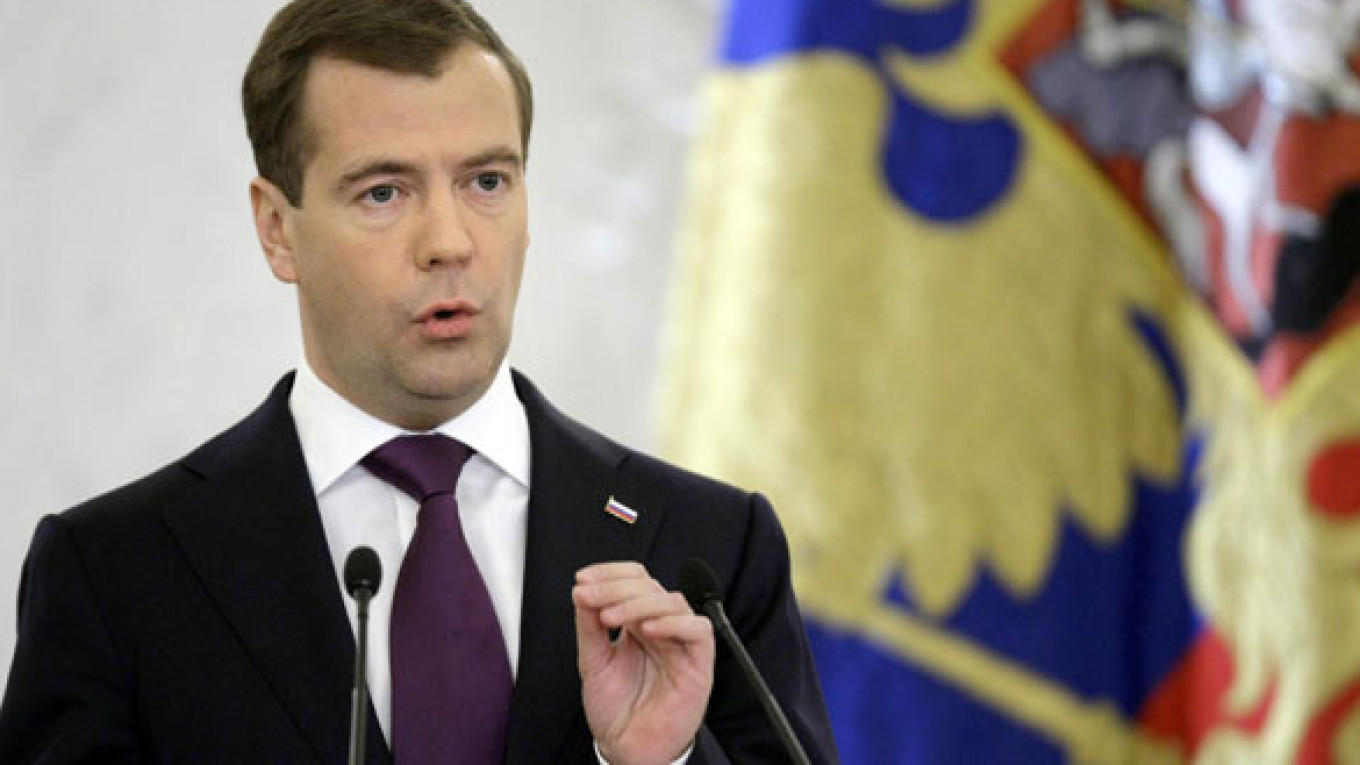Не могу не сказать: I must say, literally “I can’t not say”
I used to analyze the annual Russian presidential addresses for linguistic clues to the country’s future. But then I got bored. What was the point of counting up the number of references to правовое государство (government based on rule of law) when we’re in Year 4 of the totally illegal construction project under my window? When they tear it down or figure out where 19 floors of tenants are going to park their cars, I’ll start paying attention to lofty programmatic statements.
But then I thought: Come on, Berdy. Give the guy a chance! So I spent an afternoon poring over President Dmitry Medvedev’s text, looking for linguistically interesting or politically revelatory turns of phrase. (Pause.) And then I read it again, thinking that maybe I missed something the first time.
In the end, what’s interesting is why it’s not interesting. The speech is so linguistically tentative, it’s like listening to an excruciatingly polite adjunct professor who is unsure of his material and scared his students don’t like him. Medvedev could use a bit of speech coaching, and since I happen to be free right now, I’d be happy to give him some advice.
First of all, stop counting. By the time we get to the fourth Шестое (Sixth), we’re so overwhelmed by the sheer number of mission impossible tasks, we want to crawl into bed with a bottle of vodka and wake up sometime in the next millennium.
Next, lose the double negatives and understatements, such as: Это тоже немалые деньги. (That’s also not a little money.) Работы у него, мягко говоря, хватает. (The work load is, to put it mildly, ample.) Не могу не сказать ещё об одной проблеме. (I can’t not mention yet another problem.) These phrases may be lovely in интеллигентный разговор (a cultured chat), but they fall flat from the podium.
Don’t bury your key points in parentheses, as in: Одна из самых острых проблем (она остаётся таковой) — это жильё. (One of the most urgent problems [and it remains so] is housing.) And tell your staff to fact-check beforehand: В некоторых регионах, например (насколько я знаю, в Ивановской области)… (In some regions, for example [as far as I know, in the Ivanovo region]…)
It’s a big mistake to start so many sentences with believing, hoping and supposing. Here’s a small sample: Считаю целесообразным (I believe it would make sense); я надеюсь… (I hope…); полагаю также… (I also suppose…); особо отмечу (I especially note…); должен откровенно вам признаться (I must honestly admit to you…) How about some ordering, announcing, declaring and asserting?
Eschew impersonal constructions; they make it seem as if you aren’t running the country. К сожалению, роль большинства политических партий в работе муниципалитетов пока практически не ощущается… (Unfortunately, the role of the majority of political parties in the work of city governments is still virtually unnoticeable…)
Proof-read for unintended meaning, like this unfortunate one about corruption: Считаю, что мы должны самым внимательным образом анализировать исполнение уже принятых решений и двигаться дальше. (I believe that we must carefully analyze how decisions already taken have been implemented and continue on.)
End on a high note with no qualifications. Not: Я уверен, так и будет! (I’m sure that’s the way it will be!), but plain old: Так и будет! (That’s the way it will be!)
Come on, Mr. Medvedev! You’re the President!
Michele A. Berdy is a Moscow-based translator and interpreter, whose collection of columns, “The Russian Word’s Worth,” was published by Glas.
A Message from The Moscow Times:
Dear readers,
We are facing unprecedented challenges. Russia's Prosecutor General's Office has designated The Moscow Times as an "undesirable" organization, criminalizing our work and putting our staff at risk of prosecution. This follows our earlier unjust labeling as a "foreign agent."
These actions are direct attempts to silence independent journalism in Russia. The authorities claim our work "discredits the decisions of the Russian leadership." We see things differently: we strive to provide accurate, unbiased reporting on Russia.
We, the journalists of The Moscow Times, refuse to be silenced. But to continue our work, we need your help.
Your support, no matter how small, makes a world of difference. If you can, please support us monthly starting from just $2. It's quick to set up, and every contribution makes a significant impact.
By supporting The Moscow Times, you're defending open, independent journalism in the face of repression. Thank you for standing with us.
Remind me later.








